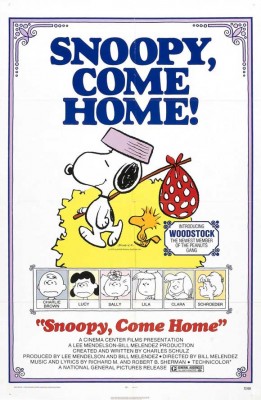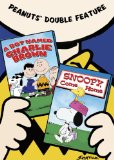| Reviews & Columns |
|
Reviews DVD TV on DVD Blu-ray 4K UHD International DVDs In Theaters Reviews by Studio Video Games Features Collector Series DVDs Easter Egg Database Interviews DVD Talk Radio Feature Articles Columns Anime Talk DVD Savant Horror DVDs The M.O.D. Squad Art House HD Talk Silent DVD
|
DVD Talk Forum |
|
|
| Resources |
|
DVD Price Search Customer Service #'s RCE Info Links |
|
Columns
|
|
|
Peanuts Double Feature (A Boy Named Charlie Brown / Snoopy Come Home)
And yet they're pleasant enough on their own terms, and adults will appreciate the sophisticated humor emanating from creator Charles M. Schulz's angst-ridden children and free-spirit beagle.
Both titles have adequate 16:9 enhanced widescreen transfers but offer no extra features or even alternate language or subtitle options, though they are closed-captioned.
(For comments about A Boy Named Charlie Brown, my review of the original DVD is here.)
Unlike the surprisingly adult A Boy Named Charlie Brown, Snoopy Come Home seems to be reaching for a more mainstream audience, in a market then almost completely dominated by the Disney organization. Its story is more sentimental, often sloppily so, with the focus shifted away from the kids to the adventures of Charlie Brown's pet beagle, Snoopy, and Snoopy's companion, an awkward little yellow bird named Woodstock. (Officially introduced in this feature, though he first appeared in the strip in 1967.)
Though not usually identified as such, Snoopy Come Home is essentially a musical, and as further evidence Schulz and producers Lee Mendelson and Bill Meléndez (also the director of both films) were being influenced by Disney, they hired songwriter brothers Richard M. and Robert B. Sherman, best known for Mary Poppins and other Disney films of the period. Another "Disney Legend" (he was so honored in 1995), Thurl Ravenscroft provides a running gag booming "No Dogs Allowed," at various public and private buildings, obstacles Snoopy faces at every turn. (And which pays off at the end of the movie.) Shelby Flint, who provides Lila's singing voice, performed a similar but superior song in Disney's The Rescuers a few years later.
As with Rod McKuen's music for A Boy Named Charlie Brown, the Sherman Brothers' nine songs, several of which are reprised, don't quite work in the Peanuts universe, though the results are less jarringly out of place. On the other hand, the songs aren't among the brothers' best and are for the most part unmemorable. They rarely connect with or enhance the characters or the emotions on-screen. Apart from the songs the orchestral underscoring works not at all and had this reviewer longing for Vince Guaraldi's jazzy themes, this being the only Peanuts project Guaraldi didn't score prior to his untimely death in 1976.
Snoopy's unhappiness with surly master Charlie Brown (Chad Webber) and friends Linus (Stephen Shea, taking over the role first played by brother Christopher) and Lucy (Robin Kohn) coincides with the arrival of a letter from a young girl named Lila (Johanna Baer), who's lonely and confined to a hospital bed. Because there's not really enough story to accommodate an 80-minute movie, the film is oddly structured as a kind of mystery, with the exact nature of Lila's relationship with Snoopy (Bill Meléndez) kept under wraps until almost the end.
While small children were probably more interested in the adventures of Snoopy and Woodstock, it's too bad so little of the film spends time with the kids, who say and do funny things. While playing Monopoly, Lucy gloats about owning hotels on both Boardwalk and Park Place, telling Charlie Brown, "I'm going to destroy you economically." She then immediately goes bankrupt.
Tomboy Peppermint Patty (Christopher De Faria), perennial fodder for pop culture queer theorists and the like (and voiced through the years by both girls and boys), becomes even more sexually confused when she develops a crush on Snoopy. "You kinda like me, don't you?" she asks him early on. Later, when Snoopy fails to show up for a "date" she says, "I think I've been stood up ...Maybe I came on too strong for him." Poor girl.
On the long road to meet Lila, there's a strange subplot where Snoopy and Woodstock are mistaken for strays and held virtual prisoners by a young manic-depressive-type girl (Linda Ercoli). She's all sweetness and light one minute, wild-eyed, abusive and cruel the next. It's a disquietingly authentic portrait of an emotionally disturbed child and bizarrely out of place like much of the film. In another odd moment, Charlie Brown, kid sister Sally, and Snoopy visit the local library. The titles of the books on the shelves are completely illegible with but one exception: Sambo (as in Helen Bannerman's controversial The Story of Little Black Sambo). This peculiar reference is sometimes cut for television airings.
The film was not a success, though that may have had more to do with distributor National General, then in decline, than the movie itself. (I first saw this at the drive-in on a mismatched double-bill with Big Jake, a violent John Wayne Western.)
Video & Audio
Both films are 16:9 enhanced and are adequately transferred, with some of the onscreen imperfections more a reflection of the lower-budget animation than the video transfer. For some reason Snoopy Come Home's opening and closing titles are pillar-boxed leaving an image of about 1.40:1 The credits are very tightly framed, and though the rest of the film looks just fine at 1.78:1 it may have been intended for 1.66:1 projection, probably with an eye on future television airings down the road. Though originally released mono, the 5.1 Surround and English stereo remixes are pleasing to the ear and the films are closed-captioned but with no alternate audio or subtitle options. The two discs, retaining their 2006 copyrights, are region 1 encoded. There are no Extra Features.
Parting Thoughts
Though far from perfect, A Boy Named Charlie Brown and Snoopy Come Home are ambitious low-budget animated features that deserve points for experimenting with the formula established in the television specials, even when the experimentation doesn't work. Overall still pleasant all these years later, both pictures are Recommended.
Kyoto-based film historian Stuart Galbraith IV's latest book, Japanese Cinema, is on sale now.
|
| Popular Reviews |
| Sponsored Links |
|
|
| Sponsored Links |
|
|
| Release List | Reviews | Shop | Newsletter | Forum | DVD Giveaways | Blu-Ray | Advertise |
|
Copyright 2024 DVDTalk.com All Rights Reserved. Legal Info, Privacy Policy, Terms of Use,
Manage Preferences,
Your Privacy Choices | |||||||














